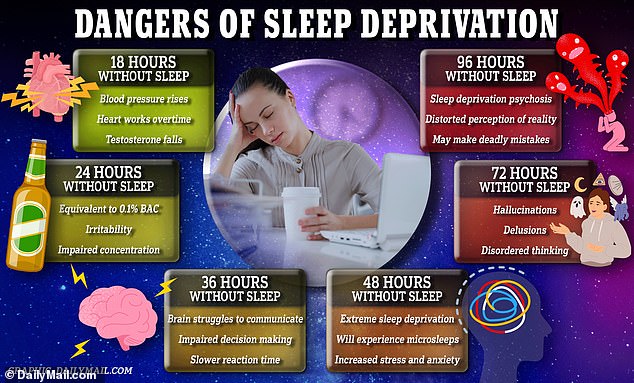Allowing children to use smartphones and tablets or watch television before bed has “little impact” on how they sleep, research suggests today.
Experts have long warned about the influence of screen time on children’s development.
But New Zealand scientists, who tracked the screen time of dozens of children between the ages of 11 and 14, found that their sleep health was unaffected.
Only when they used their devices in bed did it take longer to fall asleep.
This comes after Swedish health officials ruled yesterday that young children should not be allowed to watch television or screens and that screen time for older children should be limited.
Experts have long warned about the impact of screen time on children’s development. But New Zealand researchers who tracked the screen time of dozens of children aged 11 to 14 found that their sleep health was unaffected.
Experts have previously warned that children who regularly use smartphone, tablet and computer screens may be more irritable, have poorer concentration and remember information only half as long as children who do not.
Studies also indicate that children who spend more time in front of screens are more likely to develop behavioral problems or childhood depression.
But the study’s lead author and an expert in electronic media and sleep at the University of Otago said: “Our most interesting findings were that this screen time before bed had little impact on sleep that night.
‘However, screen time once in bed did affect their sleep: it kept them from falling asleep for about half an hour and reduced the amount of sleep they got that night.’
“We need to revise our sleep patterns so that they fit the world we live in and actually make sense; the current ones are not achievable or appropriate for our lifestyle.”
In the study, researchers asked 79 children between the ages of 11 and 14 to wear a body camera on their chest from three hours before bedtime until they went to sleep.
In addition to the body camera that captures when, what and how they used their screens, a second infrared camera was placed in their bedrooms to capture their screen time while in bed.
They also wore an actigraph, a watch-sized device that measures sleep.
During a one-week follow-up, they found that 99 percent of participants used screens in the two hours before bed.
Meanwhile, more than half used screens once in bed, and a third used them after trying to go to sleep at night.
They also found that once in bed, more screen-intensive activities like gaming and multitasking (using more than one device at a time, such as watching Netflix on a laptop while playing Xbox) were more detrimental to their sleep.
Dr Brosnan said: ‘Every additional 10 minutes of this kind of screen time reduced the amount of sleep they got that night by almost the same amount.
‘Our findings suggest that the impact of screen time on sleep is primarily due to a temporal shift that delays sleep onset, rather than any direct effect of blue light or the interaction.
‘We found no associations between sleep latency and wakefulness during the sleep period.’
This comes after Sweden’s Public Health Agency yesterday advised parents not to allow children under two years of age to use smartphones and tablets or watch television.
Children between the ages of two and five should also be limited to one hour of screen time per day, the new recommendations say.

Lack of sleep can lead to obesity, memory loss, diabetes, heart disease, intense and unstable emotions, impaired learning ability, and a reduced immune response, leaving you vulnerable to disease.
Children between six and twelve years old should not spend more than one or two hours a day in front of a screen.
The move follows a similar one by Danish officials, who last September issued their own age-related rules allowing only children under two in “very special cases” such as those with learning difficulties to use the devices.
In 2019, the World Health Organization also recommended that children under three years of age not watch television or sit down to play on a tablet.
Children aged three and four should also not spend more than an hour a day in front of a screen, the agency said.
However, British experts at the time said the guidelines were based on poor evidence and failed to recognise that not all screen time was bad for children.
A 2019 Royal College of Paediatrics and Child Health report also concluded: “We believe that the risks of screen exposure should not be exaggerated.”
They added: ‘The literature takes little account of the growing demands that schoolwork be done on screens.
‘We found no evidence that screen-based tasks are associated with greater or lesser health benefits or harms than tasks performed in a more traditional way.’
Screen time among children skyrocketed during the Covid pandemic, when lockdowns and school closures forced them to stay home.
In the UK, neither the NHS nor the National Institute for Clinical Excellence (NICE) have detailed guidelines on screen time for babies and toddlers.
But they do recommend a maximum limit of two hours per day for all children.
The UK’s chief medical officer also suggests a “precautionary approach” to using devices with screens.

